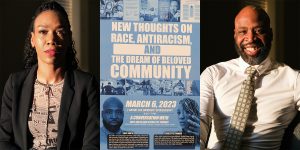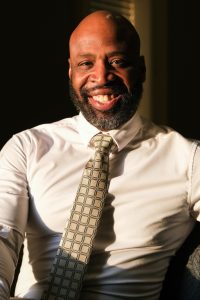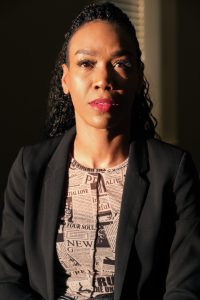During Rev. Martin Luther King Jr.’s activism journey, he instilled a new meaning in the phrase “beloved community”. A beloved community is a space in which everyone is cared for regardless of race, background, or social status.
On March 8, guest speakers Erec Smith and Starlette Thomas visited the university to discuss race, anti-racism and the dream of a beloved community with Adam Gussow, Pprofessor of English and Southern Studies.

Erec Smith is a Professor of Rhetoric at York College of Pennsylvania. Smith co-founded Free Black Thought, a website dedicated to highlighting the viewpoint of diversity within the Black community. Smith is the author of recent writing, “A Critique of Anti-Racism in Rhetoric and Composition: The Semblance of Empowerment.”
Starlette Thomas is an author, activist, visual artist and race abolitionist. As associate editor and director of “The Raceless Gospel Initiative at Good Faith Media,” she writes on the intersections of race, identity and faith formation. Thomas also hosts “The Raceless Gospel” podcast, addressing race, religion, and politics.
The event included students, professors and citizens of Oxford from all different backgrounds. This event allowed the speakers to express their philosophies relating to racial topics and allowed guests to ask questions and express their feelings on certain issues.
Gussow opened up the discussion by asking the guest speakers what a beloved community should embody.
Smith began the event by talking about a sub-genre in a rhetorical theory called interpersonal rhetoric, which includes how we talk to ourselves and our inner dialogues.
“When we do diversity training we think about how we get along and skip how we get along with ourselves,” Smith said.

Smith and Starlette Thomas spoke at a conversation on race, antiracism and community in Bryant Hall on March 6.
Photo by HG Biggs.
By getting to know ourselves before entering unfamiliar situations we aren’t bringing our baggage with us and not projecting things that we struggle with internally onto people.
“If we can focus on our interpersonal and collaborate with others to improve all of our lives then the beloved community is around the corner,” said Smith.
Thomas opened up by explaining why she believes white supremacy and race are controlling our progress to becoming a beloved community.
“Whiteness is a color, not a country. Whiteness is a social arrangement. The Constitution says, ‘We the people’, not ‘We the white people’,” Thomas said.
Smith dove into the background of why he co-founded his website Free Black Thought.
“Ultimately, people are addicted to race because they are told what they know and haven’t dug into it. We don’t all love alike, have the same goals, or have the same lifestyles. Free Black Thought is a non-profit that focuses on the individuality of black people and embraces it,” Smith said.
Thomas said she focuses on relationship and community building.
“I’m not expecting things to always go well but there are people who’ve paved the way to build a bridge because they have a larger vision and understanding of what human beings and belonging are like John Lewis,” Thomas said.

Thomas and Eric Smith spoke at a conversation on race, antiracism and community in Bryant Hall on March 6.
Photo by HG Biggs.
The audience wanted to know more about interpersonal rhetoric.
“We’re all socially constructed and raised in communities, but at the end of the day, we are a single unit of all those ideas. Our individual experiences inform those outside influences. We may have the same influences but look at the world differently. To look into interpersonal empowerment is to ask yourself why you accept and deflect certain ideas, exploring those social influences within you,” Smith said.
Thomas’ ideas regarding race seek to empower us to see people aside from their race and begin to find out who they are internally. Both speakers want people to see past white supremacy and that race doesn’t give a rank of superiority.



























